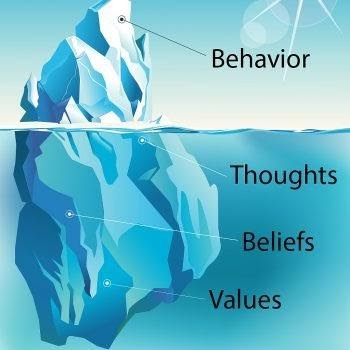
There are numerous benefits for organizations in declaring a set of core values that embody the way you wish to go about achieving your mission or purpose. Driving collaboration and teamwork between likeminded individuals is one. Streamlining decision-making process by aligning everyone with the same ideals about the way the organization does business is another.
One of the most powerful aspects of having a strong set of organizational values is the ability to communicate who you are and what you stand for to your stakeholders. This is the case for customers, employees, service partners, investors and local communities. In the emerging paradigm we refer to as the Values Economy, successful organizations will establish a sense of shared values with all stakeholder groups. When everyone knows what your organization believes in and trusts you mean it, they have no reason to go anywhere to have their needs met. Nothing creates brand loyalty faster than trust.
Who are you?
Around 82% of people believe that a good and well understood set of values can give an organization a competitive edge. It is no wonder that so many leaders are desperate to tick this box.
But simply laminating some words and putting them up on the wall, doesn’t create a successful values-based organization. To know what you value, you must first know what you stand for. Our values are never more consciously present than when they are being tested, or when we succeed.
You cannot copy another organization’s values and expect to achieve the same outcomes. Effective values statements reflect the truth at the heart of the company. They are unique and not transferrable.
It is important to follow a robust process to explore the essence of the organization. Why does the organization exist? What does it hold true to the core and will never give up? What differentiates it from others? If you are people driven, your values will reflect this, and, if you are profit driven, that is fine too. Values are neither good nor bad, they are an expression of what matters to us. For example, if money/financial performance/return on shareholder value is important above all else, it is better to be honest about this. You might discourage some people, but you will also attract the kind of customers and service users who are aligned with that kind of value ideal. What is critical is to avoid a situation where you claim that the organization stands for something and then does not live up to this with behaviours and decisions that are made by employees (all levels).
Who do we want to be?
Once you know who you are, it is easier to decide where you would like to go. You can develop a purpose statement and set of values that will serve as a beacon for every stakeholder that engages with your organization. Now is the time for clarity and simplicity. Have confidence in the words used by the people in your organization rather than feel drawn to copy and paste other people’s values. The words need to be yours. Then when you have the concise wording, give thought to how this can be communicated to every person in the organization and, more importantly, put into practice.
Community Culture
Organizations are effectively a community, comprising of the various stakeholder groups. Just like in the rest of the world, there are healthy, flourishing communities and less healthy ones. When you articulate your values, it makes it easier for likeminded people to find and align themselves with your purpose and what you stand for.
The notion of improvement and growth is applied and understood in most areas of business. So how do you apply this to the area of values in your organization? What perception do your various stakeholders have of how well your organization’s employees live up to the stated values? If you do not know the answer to this question, how can you take action to make improvements? If your values are important to you, why would you not measure your performance? We offer a corevaluescore survey which provides a snapshot of stakeholder perception of the way in which your organizational values are lived in practice.
Remember that, as with personal values, organizational values might adapt, change, and grow. Over time, the organization will be presented with new situations, opportunities, and challenges. Sometimes the core values will remain the same but might manifest themselves in different ways. In certain situations, you might feel that there is a need to re-examine or refresh your values. The key point is, from time to time, to ask the question “Are our values (and associated behaviours) still relevant and reflect our essence?”
SERVICEBRAND GLOBAL
At SERVICEBRAND GLOBAL we believe strongly in the power of organizational values. We have been delivering award-winning projects with measurable impact in this area internationally and in UK for nearly twenty years. When values are done well, they create shining beacons for employees, customers, and all stakeholders to follow. Not only that but values aligned employees and customers have much higher productivity and loyalty. You might be right at the start of your values journey or feel that it is time for a refresh, or you might be struggling to embed your values effectively in practice. Whatever stage you are at, we would love to help you take the next step so why not connect with SERVICEBRAND GLOBAL to see how we might help you create a healthier, values-driven company culture… in practice.

